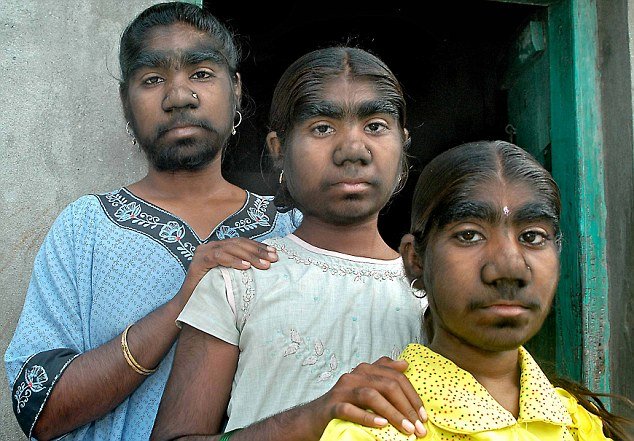
Hypertrichosis universalis disorder or werewolf syndrome is one of the rarest conditions in the world, affecting just one in a billion people.
In an incredible quirk of fate, three sisters from a small village near Pune, central India, have all been blighted by a condition known as werewolf syndrome – where they are covered from head to foot in thick hair.
Savita, 23, Monisha, 18, and 16-year-old Savitri Sangli inherited the hypertrichosis universalis disorder from their father.
All three sisters struggle to keep the condition under control with cream and hope they one day might eventually be able to pay for specialist laser treatment to rid them of their excessive hair.
Despite the devastating effects of the syndrome, the three sisters still dream of a day when they might get married.
Hypertrichosis universalis is a genetic mutation, in which cells that normally switch off hair growth in unusual areas, like the eyelids and forehead, are left switched on.
It means the girls have had abnormal hair growth on their bodies and even their faces, affecting their eyebrows, nose and giving them appearance of having a beard.
The young women must use a special cream every day – otherwise the hair will quickly return. The youngest sister Savitri is still virtually covered in hair.

The girl’s mother Anita Sambhaji Raut has six daughters in total with only three having werewolf syndrome.
The condition was passed down by the girls’ father, who Anita Sambhaji Raut was forced to marry aged at the age of 12.
Because theirs was an arranged marriage and she did not lay eyes on him until the wedding day, Anita Sambhaji Raut had no idea he was suffering from the condition himself.
Anita Sambhaji Raut and her daughters are now desperate to fund laser surgery that will help to finally remove the curse of excess hair and allow the girls to lead normal lives.
In their small village near Pune, the Sangli have little prospects for marriage and the eldest Savita sometimes gets sent home from work when her hair begins to show.
Laser surgery would cost 350,000 Indian rupees – or $7,000 per girl – but the family are not wealthy enough to be able to afford it.
Now documentary filmmaker Sneh Gupta is planning make a film of the girls in a bid to help their dream of becoming almost hair free – with the eventual aim of finding marriage.
Mum Anita Sambhaji Raut, 40, said her husband – who died in 2007 and whose portrait hangs in the family home – also suffered from werewolf syndrome.
Anita Sambhaji Raut was being looked after by her uncle and auntie as her parents had passed away and they told her if she didn’t marry this man they would kill her off.
The woman said: “It was only on the day of my marriage that I discovered what he was, (he) was hairy on his face, ears and body, that’s when I found out.
“I was very young, I didn’t know what kind of boy he was, he scared the hell out of me when he arrived at the altar. He’s the groom, I am the bride, I had no idea what all that meant.
“I was only 12 when they forced me into marriage, and if you don’t agree to marriage as a girl they will kill you off.
“I asked my mother-in-law why my daughters were born like this and she told me because their father is like this, at the time (as a baby) my daughter had little hairs all over her face.
“When I used to take her (Savita) out as a child, they used to shout here comes the beast, the witch, that’s what they said.
“They keep her at work now for 10 to 15 days, and then after that they ask her to leave as soon as the hair starts showing through, that’s what they do.
“I tell people this is the type of girl she is, hair grows on her face, she has to apply medicine, we must be honest with everybody.”
In the village society a woman does not have much prospects if she is not married and mum Anita Sambhaji Raut explained she was still trying to get her daughters a man.
Anita Sambhaji Raut said: “If a good proposal comes in, I’ll get her married. If nothing comes in she’ll have to work and survive. As long as I am living I have to keep trying.”
Eldest daughter Savita, who now using a cream to try and combat her hair growth, said: “When I used to go to school the boys and the girls would shout, <<hairy face>>, <<horrible looking>>, <<don’t sit next to her>>, that’s how they behaved.
“Marriage is not an option for us, it’s not likely to happen, who is going to marry us when hair keeps growing on our faces.”
[youtube 4bh11SfImZA]